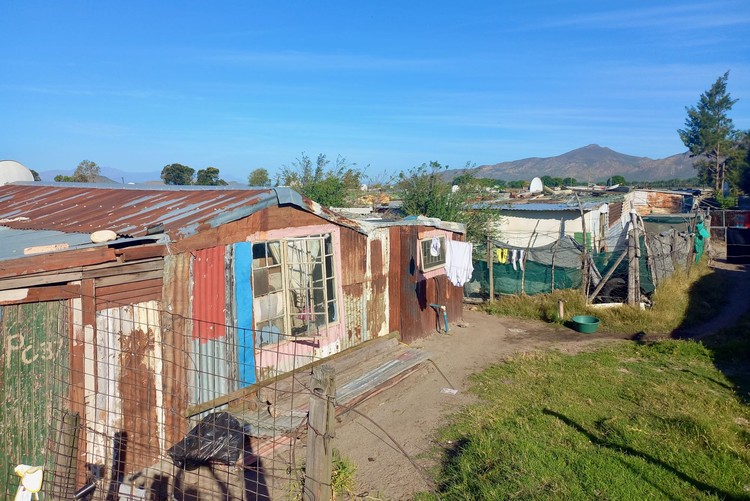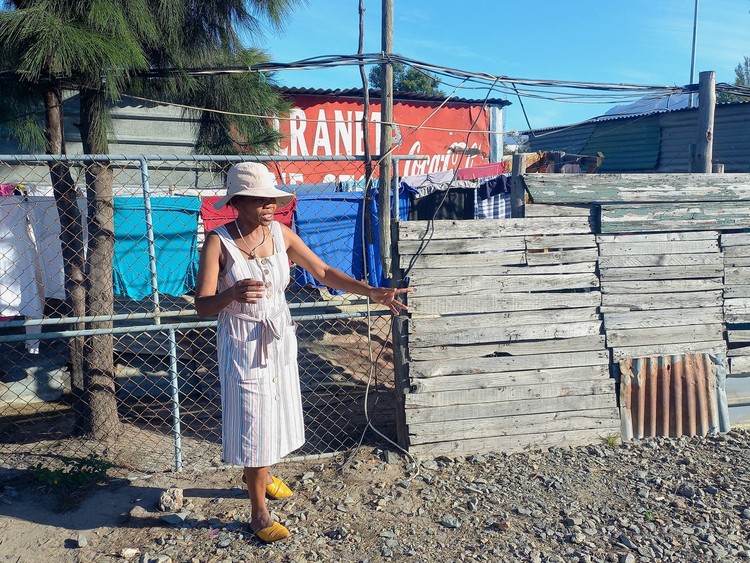Families evicted from farms have been dumped in Spoekiesdorp
The households in the Worcester informal settlement must be relocated, says the South African Human Rights Commission
Spoekiesdorp in Worcester is home to approximately 1,000 people, mostly former farm workers. Photos: Marecia Damons
- In 2022, the South African Human Rights Commission (SAHRC) received a complaint about conditions in Spoekiesdorp informal settlement in Worcester.
- The settlement of about 1,000 people, mostly former farm workers, is prone to flooding, and is without electricity and often without tap water too.
- The SAHRC found that the area is near sewage works and is a health risk, and the only solution is to relocate the residents.
- The Breede Valley Local Municipality has proposed relocation to a town 20km away, but residents say the area is unsafe and too far.
The South African Human Rights Commission (SAHRC) is investigating conditions at Spoekiesdorp informal settlement in Worcester, after receiving a complaint in November 2022 that residents have been without access to basic services for years.
The settlement, located next to the Smalblaar River and near a sewage works, is home to approximately 1,000 people, mostly former farm workers. They lack access to toilets, are often without tap water and have never had formal electricity.
In a statement, the SAHRC said residents will need to be relocated.
Last week, representatives from the SAHRC met Spoekiesdorp residents to give an update on the investigation and on relocation options.
SAHRC legal services officer Lwethu Yoli said the settlement is a safety and health risk. “We have a situation where kids are growing up next to sewage. In June, people were displaced because of the rains. That is not a situation that requires ordinary processes to be followed. It is an emergency. The residents must be relocated,” said Yoli.
Yoli told the residents that the SAHRC had engaged with the Breede Valley Local Municipality. “The municipality told us that you are in a flood line. You are located in an area that is prone to floods … They said you must find an alternative location,” he said.
The municipality offered to relocate residents to Rolilhlahla informal settlement, Avian Park, about 20km from Spoekiesdorp. But the distance as well as gangsterism in the area made it unacceptable to the community, said Yoli.
Yoli told residents that the SAHRC had spoken to two farmers, with farms close to Spoekiesdorp, who were open to having part of their land used to house residents. However, there were conditions.
“The one said there must be daycare, a police station …. The second farmer said the land must only be used to build homes for first-time home owners who are employed and fall within a certain tax bracket.”
Yoli said the SAHRC would continue to talk to Spoekiesdorp residents, the municipality and farmers to find available land.
Municipality spokesperson Hannelie Botha said since 2014 alternative land had been sought, and she confirmed Avian Park as one possible site for relocation.
Regarding electricity, Botha said that according to Eskom parts of Spoekiesdorp are below the flood line and it cannot supply electricity in those areas.
Regarding water, she said the residents needed to indicate in which areas there was no water “and the municipality will do an investigation”.
“The main problem in these informal settlements is that the community relay water to their own plots, or steal the taps as soon as the municipality installs standpipes,” she said.
She said about 80 standpipes had been installed and earlier this year a 90-metre pipeline.
Evicted and dumped
“I was just dumped here,” said Katrina Daniel, 84, who has been living in Spoekiesdorp after she was evicted from a farm six years ago.
“I have to live without water and electricity. The only time I leave my home is when I have to go out and find water, or sticks to make a fire, so that I can prepare food. It’s not dignifying to live like this because if you don’t have water, you have nothing,” she said.
Daniels lives with her two children and three grandchildren. Her children work on farms nearby.
Daniels said she has to ask neighbours for water, “but if they don’t have, then I get nothing. If they say no, it’s no. Then I have to go from door to door looking for water. I don’t like it.”
Matheko Mohobo moved to Spoekiesdorp in 2011 after she resigned from Du Toitskloof farm. She lives with her husband and two children, who have jobs.
“People didn’t necessarily choose to move to Spoekiesdorp. Many of them were evicted from the farms they worked on,” said Mohobo.
She said to access electricity, residents pay R3,500 to buy 150-metre-long extension cords. These are then connected to neighbouring houses.
Mohobo said Spoekiesdorp residents pay R300 to “rent” an electricity meter from home owners, and spend R100 weekly on electricity. “We don’t have another choice … The municipality is aware of how we are struggling”.
“In winter we have enough water, but not in summer. Instead, we are battling with shack fires. But then there isn’t any water to put out the fire,” said Mohobo.
She said residents have been so desperate for water at times that they drink from the canal nearby. But many have fallen ill.
Monica Sampson has been living in Spoekiesdorp since she was evicted from a farm 12 years ago.
“When it rains, the whole area is covered in water. Next to the river, it’s mostly sand. So when it floods, our homes are filled with mud,” she said.
Her home was flooded after the heavy rains in September. “I lost everything. My clothes, cupboards, tables, chairs, my bed, my ID and other personal documents were all gone. It was heartbreaking,” she said.
“That’s why we’re asking for – just a bit of land to move to so that we know we are safe,” Sampson.
Monica Sampson said after the heavy rains in September, Spoekiesdorp was flooded. “Our houses looked so bad afterwards. Everything was a mess. People lost cattle. The nearby soup kitchen also flooded and the pots and food were washed away, so people didn’t have food to eat.”
Support independent journalism
Donate using Payfast

Next: Disability group battles to keep going after robbery
Previous: Housing in South Africa: How have we done since 1994?
© 2023 GroundUp. This article is licensed under a Creative Commons Attribution-NoDerivatives 4.0 International License.
You may republish this article, so long as you credit the authors and GroundUp, and do not change the text. Please include a link back to the original article.
We put an invisible pixel in the article so that we can count traffic to republishers. All analytics tools are solely on our servers. We do not give our logs to any third party. Logs are deleted after two weeks. We do not use any IP address identifying information except to count regional traffic. We are solely interested in counting hits, not tracking users. If you republish, please do not delete the invisible pixel.


